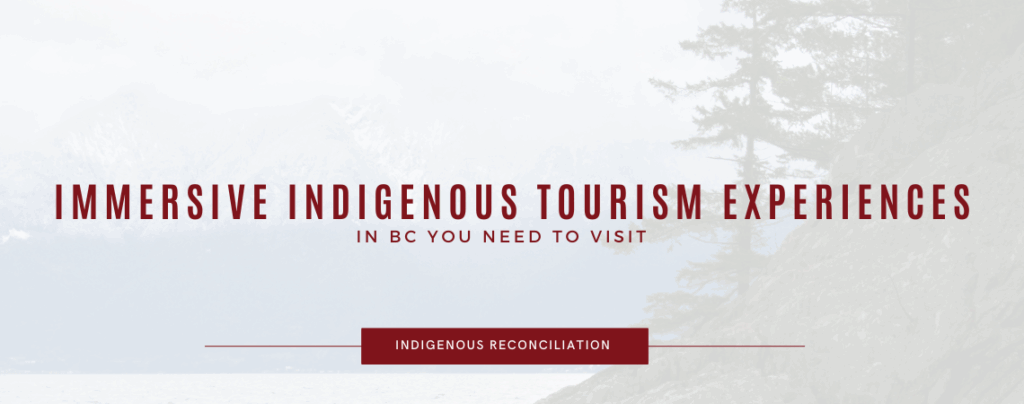
September 30th is the National Day for Truth and Reconciliation, a time to honour Survivors, remember the children who never came home, and recognize the lasting impact on Indigenous communities. Reconciliation calls on all of us to listen, learn and take meaningful action in support of indigenous Peoples.
One way to reflect is by engaging with Indigenous arts, culture, and traditions. These experiences offer a chance to see the land, stories, and history through Indigenous perspectives. They remind us that reconciliation isn’t a one-day event, but something we practice in our daily choices: where we travel, what we learn, and who we support.
Here are five experiences across British Columbia that offer space for reflection, connection, and learning.
1. Klahoose Wilderness Resort – Desolation Sound
The Klahoose First Nation has cared for the lands and waters of Desolation Sound since time immemorial. Their wilderness resort is a beautiful getaway, but it’s also a place to learn and connect.
Guests are welcomed into experiences that include:
- Learning about sustainable practices guided by Indigenous knowledge.
- Taking part in cultural ceremonies and storytelling with Klahoose hosts.
- Exploring coastal ecosystems while understanding their deep cultural meaning.
Visiting Klahoose Wilderness Resort is a way to support Indigenous sovereignty and community well-being, while leaving with a greater appreciation for the ties between land, culture, and people.
2. Powwows in BC – Celebrating Living Tradition
Powwows are sacred gatherings that honour resilience, culture, and community. The sound of drums, songs, and dance carry stories of strength and celebration across generations. In many places across BC, communities open their powwows to the public.
For visitors, it’s an opportunity to:
- Witness traditions that are alive, vibrant, and passed from one generation to the next.
- Celebrate alongside Indigenous families and communities.
- Recognize that Indigenous culture is living, evolving, and thriving.
Organizations like Indigenous Tourism BC share details on upcoming powwows, making it easier to take part in a way that’s respectful and meaningful.
3. Spirit Gallery – Horseshoe Bay
Nestled in Horseshoe Bay, Spirit Gallery showcases Indigenous artistry that bridges tradition and innovation. From carvings and jewelry to paintings, every piece tells a story connected to the artist’s Nation, teachings, and land.
When you support Indigenous artists by visiting, purchasing, or simply learning about their work, you’re:
- Keeping cultural traditions alive and passed down.
- Strengthening the livelihoods of artists and their communities.
- Gaining a deeper understanding of the storytelling woven into every creation.
A stop at Spirit Gallery is both an inspiring cultural experience and a way to stand in solidarity with local Indigenous creators.
4. Talaysay Tours – North Vancouver
Talaysay Tours offers something powerful: the chance to see familiar places through an Indigenous lens. Guided by cultural ambassadors, participants walk through forests, shorelines, and waterways, learning stories rooted in Coast Salish traditions.
Their “Talking Trees” and canoe tours:
- Highlight Indigenous stewardship of the land and water.
- Share teachings from Elders and knowledge keepers.
- Encourage reflection on how we interact with the environment today.
Walking with Talaysay is an opportunity to see the land with new eyes and carrying forward a deeper respect for the place we call home.
5. Clayoquot Wild – Clayoquot Sound
Owned and operated by the Nuu-chah-nulth peoples, Clayoquot Wild weaves together ecological tourism with cultural teachings. Every tour is guided by the relationships Indigenous communities hold with wildlife, waters, and territory.
Visitors can join:
- Whale and wildlife watching tours enriched with cultural interpretation.
- History tours led by Elders, where stories connect landscapes to lived experience.
These experiences remind us that protecting ecosystems also means honouring the cultures and knowledge systems that have safeguarded them for time immemorial.
Our Time to Reflect
Reconciliation is a lifelong commitment to learning, respect, and action. Choosing Indigenous-led tourism, supporting Indigenous artists, and participating in cultural gatherings are just some of the ways we can honour that commitment in tangible ways.
On September 30th, and every day after, we are called to listen, to learn, and to uplift Indigenous voices and communities. Their resilience, knowledge, and stewardship continue to shape the lands, waters, and cultures that make British Columbia — and Canada — what they are today.